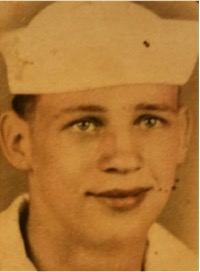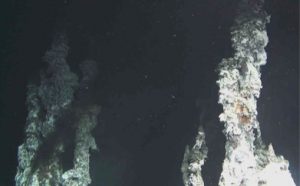My grandfather was sixteen years old the first time he tried to enroll in the Navy. It was a different era, and a time when young men felt it was their duty and responsibility to defend their country during a time of war. For many, that meant taking up arms. Serving in the Navy shaped the values, perspectives, and character of my grandfather in ways I’m sure I will never fully comprehend. That sailor went on to have a family, and became one of the most influential figures of my young life. We were Thelma and Louise with a sixty-year age difference, and however unconventional it may have been, he was my best friend. He passed down his principles to me, his blue eyes and demeanor, and of course, his love of the sea.

Frederick Carl “Framp” Grosche.
The first time I ever saw the ocean was with my grandfather and brother at Bradley Beach, New Jersey. I remember as vividly as if it had happened yesterday, the smell of the sand and salt as we hurriedly emptied out of the car, rushing over a dune, and looking outwards in anticipation of the notion of what I thought the ocean would be. It was a moment of complete and total awe. I was dumbfounded by the incomprehensible size and magnificence of it all. Crystal blue extended out into forever, reaching up into the sky. How could it be that some people could go their entire lives without seeing such beauty? Now that moment, and my grandfather, live on only in memory. Time and circumstance have shaped me into a person who feels like a distant relative of that girl on the sand dune. But each time I see the ocean, I’m brought back to that day, and the familiar feeling of awe is new again.
The stories I heard of his time at sea were few and often second-hand through other relatives. I suppose war stories were not something my grandfather regarded appropriate for a little girl to hear. The bits and pieces of his adventures planted a seed in my mind that eventually infects the minds of oceanographers, seaman, and lovers of the sea alike. The seed of the plan for my own adventures travelling the ocean. It seemed at first like nothing more than the idle musings of a child to my friends and family, but the seed took root, and the roots expanded and grew stronger with passing time. I had begun graduate studies when my childhood plan morphed into reality. When the opportunity to board the R/V Atlantis came, I did not hesitate to say yes.
I first boarded the Atlantis December of 2013 during my third year of graduate studies. The trip itself was a welcome reprieve from the monotony of school, studying, and the routine of everyday life. Looking back now, the trip was a glorious blur. How is it that time slips by, speeding up and slowing down like a river twisting and turning through the terrain of life? I fell in love with a life of no land in sight, without the distractions of cell phones and indulgence in internet, and with a new aversion towards the excess things in life that were simply unnecessary clutter. The sea felt like home in a way a new place never had before. I found comradery in scientists with the same passions and research interests as my own, and formed friendships with crew members who told stories of their adventures traveling the world. I saw the sun rise every morning and watched as it cast dazzling sparkles across the water, got lost in a new rhythm of exploration, science, friendship and introspection. It was an incredible journey, and when it drew to a close, I quietly accepted it had ended, thankful for the experience, and wondering if it was the last of its kind. I didn’t know then that another spectacular voyage was on the horizon, this time of grander proportions. It was 2017 and I was preparing to finish my graduate studies, when the possibility of another research expedition solidified into a reality. This time, the submersible Alvin was on board, and I was given the opportunity to go into the depths. It was a once in a lifetime opportunity, and of course I said yes.

Riftia tubeworms surrounded by mussels.
A peculiar calm fell over me the day of my first dive in the submersible Alvin. The ocean and sky greeted me with their vast display of blue and choppy sapphire waves licked the sides of the ship, causing it to bob lightly up and down. The Alvin awaited, hanging within the A-frame as the scientists and crew prepped for the dive. Time fast-forwarded and suddenly I was climbing the stairs to the hatch, removing my shoes. Rung by rung, I lowered myself into the Alvin, the smell of metal hung in the air. Light from the switchboards bathed the sub interior in a red glow which intensified as the sub descended into the dark abyss. During the descent, I felt what I can only describe as an intense déjà vu that is impossible to substantiate, and even more impossible to explain to others. It all felt so incredibly and unexplainably familiar.
Bioluminescence peeked in from the portholes, flickering bright green against the inky black surrounding us. We approached the bottom, a barren surface of grey crevices carved out of the seafloor. Who knew how lovely grey could look? We approached a hydrothermal vent field and abruptly, life erupted. Fields of alien-nesque tubeworms spread out in front of us as we floated along the seafloor. Pale yellow mussel beds studded the valleys dipping between. Shimmering fluids streamed through the water, tousling the fauna caught in its reach. The biology was incredible. We approached vent site Bio9 and I was floored yet again by a massive sulfide structure jutting up from the seafloor, spewing scorching black clouds of minerals from its throat. How incredibly beautiful the works of nature really are.

Black Smoker Sulfide Structures at Bio9 Vent tower over the seafloor.
The dive lasted for seven hours, but time mysteriously sped up once again, and before I knew it, I was back on deck being greeted and congratulated with two cold buckets of ice water over the head, customary tradition for first divers. Many of my friends and fellow divers have written of their time at the bottom of ocean since our first Alvin dives, and it’s apparent that the experience has had a profound effect on us all. Now the cruise is coming to an end, and again I am left wondering if the experience will be the last of its kind. The ship is steadily advancing towards Costa Rica, a life of land, of work to be done, and a thesis to be finished. As the burning sun slowly sinks into the ocean, casting pale hues of pink onto the waves, I have a singular feeling, that there are yet more adventures on the horizon.


